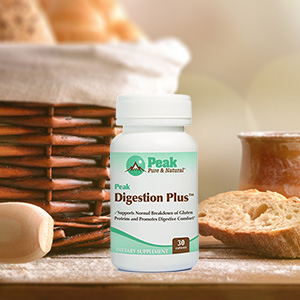Get Easy Health Digest™ in your inbox and don’t miss a thing when you subscribe today. Plus, get the free bonus report, Mother Nature’s Tips, Tricks and Remedies for Cholesterol, Blood Pressure & Blood Sugar as my way of saying welcome to the community!
Why the FDA’s new food labeling rules put allergy sufferers at risk

When you have a food allergy, you become very good at inspecting labels. That’s because, if you don’t, it could have serious consequences…
Like diarrhea, nausea, hives, vomiting, dizziness… or even anaphylaxis, a tightening of the airways that can be deadly. But what if, despite all your careful label reading, you’re still exposed to a food allergen because it’s not listed on the label?
That’s pretty much a food allergy sufferer’s worst nightmare. And unfortunately, it’s more likely to happen now since the FDA announced relaxed food labeling rules to keep packaged food in ample supply during the pandemic.
These new rules allow food manufacturers to swap out one ingredient for another without mentioning it on the label. Here’s everything you need to know about these new rules…
A rundown of the FDA’s new food labeling rules
In an effort to give food manufacturers flexibility to make minor formulation changes during the pandemic, the FDA has decided that food manufacturers can change an ingredient in their products without mentioning the change on their label.
That means they don’t have to tell you everything that’s going into your food, which is alarming, to say the least. But there are a few rules they have to follow…
Ingredients they add to a product can’t have “any adverse health effect.” That rule covers the most common food allergens like gluten, eggs, tree nuts and soybeans. They can’t add those to a product without listing them on the label. But here’s the thing… not everyone’s food allergies fall under the “common” category.
Related: Does the sea hold the solution to your food allergies?
Some people have less common food allergies, like avocadoes, corn or mangoes. In fact, people can technically be allergic to any food. So, while this rule protects some people, it leaves a lot of other people in a sticky situation.
The ingredients manufacturers leave out or substitute also can’t make up more than 2 percent of the food product. But as any food allergy sufferer knows, 2 percent of an allergen is more than enough to trigger a reaction.
The FDA also says food manufacturers can’t change a product’s signature ingredients (like the raisins in raisin bread) and that the ingredients they leave out or swap out can’t change the nutrition of the product.

Peak Digestion Plus™
All natural digestive formula with enzymes and probiotics helps soothe digestive upset caused by common food irritants and promotes the health of your gut.
But all that doesn’t change the fact that a lot of people with food allergies will be shopping blind in the coming months…
They won’t have any way to know for sure that the packaged food they purchase doesn’t contain the allergen they’re trying to avoid. This adds an extra layer of stress to an already stressful time. It also sets a dangerous precedent for future food labeling in this country.
“What scares me the most is that this temporary loosening of the laws will stick around for longer than should be permitted,” Bonnie Taub-Dix, RDN, author of Read It Before You Eat It — Taking You from Label to Table, told TODAY. “We don’t want the noise of politics to take precedence over the needs of people.”
How to protect yourself from hidden allergens
So, how do you protect yourself from hidden food allergens during this pandemic? Well, according to Taub-Dix, any food that directly states it’s free of an allergen on its packaging (gluten-free, shellfish-free, etc.) should be safe to eat. She also recommends contacting a manufacturer and asking them whether it contains an allergen if you ever feel uncertain about a particular product.
Dave Bloom, CEO of SnackSafely.com, told Today that he plans to only shop from manufacturers that have developed a partnership with his advocacy group and shown their commitment to transparency in allergen labeling. Here’s a list of those manufacturers.
Another way to reduce your risk of accidentally purchasing something that contains an allergen is to buy more whole foods and less packaged and processed foods. When you buy a tomato, chicken breast or whole oats, you know what you’re getting. That’ll make shopping less stressful… and makes you healthier as well.
Sources:
- Relaxed food labeling rules from the FDA could spell danger for allergy sufferers — Today.
- FDA Announces Temporary Flexibility Policy Regarding Certain Labeling Requirements for Foods for Humans During COVID-19 Pandemic — U.S. Food and Drug Administration.
- Food Allergy — Mayo Clinic.
- 8 Uncommon Food Allergies — Healthline.













